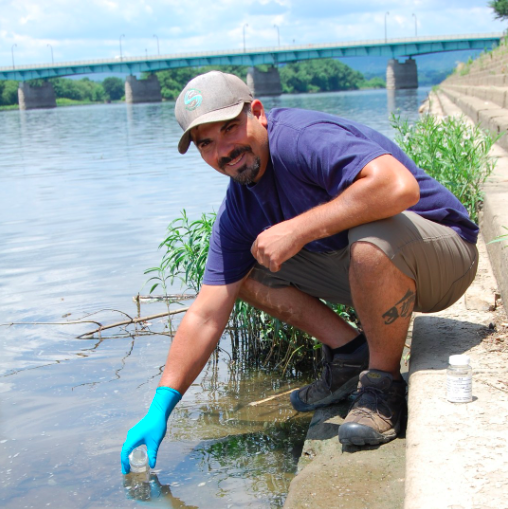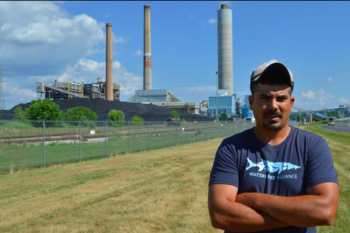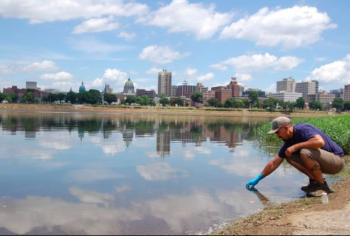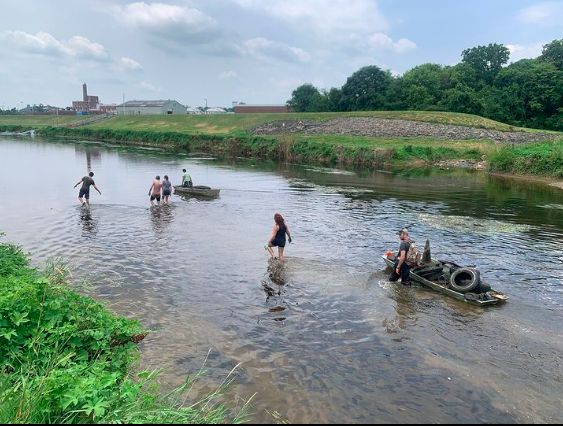Who Is Waterkeeper: Ted Evgeniadis, Lower Susquehanna Riverkeeper
By: Thomas Hynes

The Susquehanna River is the longest river on the east coast of the United States. It runs for nearly 500 miles from Cooperstown, NY through the state of Pennsylvania and on to the Chesapeake Bay where it terminates.
Ted Evgeniadis did not grow up around the Susquehanna, but rather nearby in the state of New Jersey, where he spent a lot of time seeking out water. He was either looking for places to fish along the Delaware River or enjoying the surf along the state’s iconic shoreline. In 2008, Ted moved to the York, Pennsylvania area for what ended up being a brief career in finance after graduating from York College of Pennsylvania in 2013. While attending College, he got involved with the Lower Susquehanna Riverkeeper organization. At first, he started attending cleanups, and getting involved with other projects. Soon, he joined the board, and worked as their treasurer.
“I met people at those cleanups that I would have never met at any other time in my life, and a lot of those people became very good friends,” says Ted. “There are a lot of people who deeply care about our water and about our environment and I wanted to surround myself with them.”
When his predecessor resigned in 2017, Ted was offered the position of Riverkeeper. Though he was surprised by the offer, it didn’t exactly take him long to accept the role. It also didn’t take long for him to leave his mark on the organization. Since taking over, Ted has added more members, more staff, and brought more cases against polluters.
“In Pennsylvania, we all have a right to clean water. It’s an amendment in our state constitution, and when our rights are being stripped away from us, I have a problem with that. It’s in my nature to stand up for people and to make sure that people who are doing wrong, stop doing wrong. I saw this as a career in the making. I was very drawn to the opportunity,” says Ted. “Granted, I had no idea what I was getting myself into.”
 Ted’s first project as Lower Susquehanna Riverkeeper brought him to his own backyard, where, through monitoring and analysis, he discovered a coal plant’s ash pond had been leaching and seeping arsenic, sulfates, and other toxic heavy metals into the ecosystem. After presenting his evidence to the state, the pond was not just capped and closed, as others routinely are, but instead fully de-watered and excavated. There was also a million dollar fine, as well as supplemental environmental project funding for two stream restoration projects in York County.
Ted’s first project as Lower Susquehanna Riverkeeper brought him to his own backyard, where, through monitoring and analysis, he discovered a coal plant’s ash pond had been leaching and seeping arsenic, sulfates, and other toxic heavy metals into the ecosystem. After presenting his evidence to the state, the pond was not just capped and closed, as others routinely are, but instead fully de-watered and excavated. There was also a million dollar fine, as well as supplemental environmental project funding for two stream restoration projects in York County.
“We need our water protected, and I can think of no other organization that has the passion and the people to make sure that happens than Waterkeeper Alliance.”
Meanwhile, up river in Harrisburg, combined sewer overflow (CSO) events are running amok and negatively impacting water quality downstream. This relatively small capital city is responsible for more CSO damage to the Chesapeake Bay, which is remarkable when you consider that the much larger cities of Baltimore, Washington, DC, and Norfolk, VA are also within the watershed. In 2021,Ted and Lower Susquehanna Riverkeeper Association represented by Environmental Integrity Project filed a complaint against the city and water authority and penned opinion pieces about the dangers this pollution poses to the river.
Like a lot of American waterways, the Susquehanna River is also contaminated with PFAS, the dangerous forever chemicals found throughout the country. In fact, when Waterkeeper Alliance released its national report on PFAS, the Susquehanna River received the unfortunate designation of having the highest reported totals of PFAS of any tested waterbody in the country. The culprit is a landfill which discharges to Kreutz Creek which flows into the Susquehanna River in York County, PA. For reference, the levels of PFAS uncovered by Ted were exponentially higher than what the U.S. Environmental Protection Agency considers a safe amount. As Ted explained to the York Daily Record newspaper, “They’re not just high. We’re talking about serious contamination.”
 Though the national PFAS testing campaign from Waterkeeper Alliance concluded a few months ago, Ted continues to test his watershed for these dangerous chemicals. He has made it a part of his monthly monitoring program and soon will expand it to include private wells. He has also helped keep the offending landfill from their planned expansion which would have caused even more damage to the watershed.
Though the national PFAS testing campaign from Waterkeeper Alliance concluded a few months ago, Ted continues to test his watershed for these dangerous chemicals. He has made it a part of his monthly monitoring program and soon will expand it to include private wells. He has also helped keep the offending landfill from their planned expansion which would have caused even more damage to the watershed.
“We sent thousands of letters, went to town meetings, and met with the Board of Supervisors. In the end, the planned expansion was stopped. So the residents are happy. But there is still this existing terrible landfill,” says Ted. “We need to be sure that people aren’t taking their kids or dogs there. We need to make sure people are staying the hell out of the creek. People have gotten cancer and died because of this landfill.”
In November 2022, Ted filed a notice of intent to sue the landfill for continuous permit violations and PFAS contamination. He intends to file a formal complaint in federal court following the 60-day notice.
Looking ahead, Ted is keeping tabs on several proposed projects that would hurt his watershed, including a proposed highway that would run through historic sites, farmland, two different creeks, and even some wetland habitats. Though individual projects can do harm, he sees the lack of political will as the greatest threat to the health of the river. It leads to a lack of oversight or protection from government agencies who either don’t feel compelled or aren’t funded adequately enough to do their jobs. Ted is more than happy to fill that void as a member of Waterkeeper Alliance.
“When I read the history of Waterkeeper Alliance, and how things started, it brought a smile to my face. Hearing the history on the Hudson River and how everything first molded and shaped to now become what we are today. It’s a story that needs to be told more often and to a lot more people,” says Ted. “We need our water protected, and I can think of no other organization that has the passion and the people to make sure that happens than Waterkeeper Alliance.”
